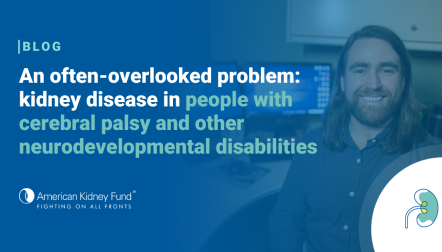
Blog post
Recovering from a silent disease

"Why am I doing this?" Sally Carrubba asked her doctor and herself as she was going through the testing process prior to receiving her kidney transplant. For Sally, the whole situation was surreal and hard to wrap her mind around because even though she was in stage 5 kidney disease with severe damage to her kidneys and very close to kidney failure, Sally had no symptoms and there were no signs that anything was awry.
"Until very late [in my battle with kidney disease], I never really thought of it as kidney disease," Sally said. "I didn't know what it was that I had.* For a couple of decades, I was in stage 3, but slowly my creatinine numbers climbed and I went from stage 3 to stage 5, skipping over stage 4 altogether."
Once Sally was in stage 5, her doctor sent her to a nephrologist (kidney doctor). "The first thing he says to me is 'Perhaps we should put you on the transplant waiting list,'' Sally said. "I freaked out [when I heard that] because that was the first time that I understood how much trouble I was in." Sally then went to the New York University (NYU) transplant center, where they told her that her estimated glomerular filtration rate (eGFR) was a mere 11 (eGFR is a measure of how well your kidneys are working; a healthy kidney has a GFR of 90 or higher). Since Sally's eGFR was under 20, she qualified for a kidney transplant. Hearing this news was deeply unsettling for Sally. "I was a nervous wreck until I came to terms with it," she said.
But even when she did come to terms with what was happening to her, Sally was uncomfortable seeking out a living donor for her transplant. "How do you go around talking to people and say 'Oh by the way, I have kidney disease. Would you like to give me one [of your kidneys]?'" she said with a laugh. "I thought it was pretty nervy to ask someone to do that."
Fortunately, once they found out about her condition, several of Sally's family members got tested, and her first cousin's daughter, Cherie, turned out to be a match, which thrilled Sally. In spring 2021, Sally underwent a kidney transplant surgery. After the operation, Sally didn't leave her house for months. The COVID-19 pandemic was still raging, and since she had to take anti-rejection medicines to ensure her body would not reject her new kidney, her immune system was particularly weak and vulnerable to infections. "I had everything delivered to my house," Sally said.
Sally candidly revealed that the first year or so after her transplant wasn't easy. In addition to the isolation from being homebound, the medications she took following the surgery upset her stomach, and she felt very fatigued. But once the worst of COVID-19 passed and Sally's doctors adjusted her medications, she finally started living her life again and going out to see people. She said she feels great now and her kidney function is healthy.
Post-transplant, Sally remains connected to the kidney disease community. "This transplant saved my life," she said. "I was so lucky, and you have to pass that on and think about the people who aren't so lucky. It was very important to me to give money to an organization that was going to help other people." That organization wound up being the American Kidney Fund, which Sally found while searching through Charity Navigator. "AKF had a great score [on Charity Navigator], and I knew my money would go to help people in need," she said. "Why else do you donate? You do it to help people."
Learn more about living kidney donation and transplantation here.
To donate to the American Kidney Fund, visit our website.
*Chronic kidney disease (CKD) is divided into five stages based on how well your kidneys work to filter waste and extra fluid out of your blood. As the stages go up, kidney disease gets worse and your kidneys don't work as well as they should.



